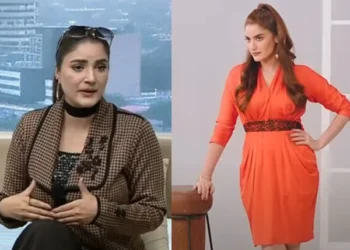Introduction: A Call to End Child Marriage in Pakistan
The United Nations Children’s Fund (UNICEF) has launched a powerful new awareness campaign against child marriage in Pakistan, a country that ranks among the top ten globally for this practice. Aiming to draw attention to the long-term consequences of early marriages on girls’ health, education, and overall well-being, this initiative seeks to spark national dialogue and policy change.
Leading the charge is renowned Pakistani actress Saba Qamar, who serves as UNICEF’s National Ambassador for Child Rights. Through an emotionally charged video message, Saba Qamar lends her voice and visibility to amplify the organization’s mission to end child marriage and protect the rights of millions of vulnerable girls across the country.
Saba Qamar’s Emotional Plea: “We Must Not Stay Silent”
In her video message, Saba Qamar speaks passionately about the harsh realities faced by young girls forced into early marriages. Her powerful words strike at the heart of the issue:
“Why should a child in Pakistan be forced into a marriage and a future that she did not choose? Despite all the risks to her health and education, how can we leave this unchallenged?”
She urges society, especially parents and community leaders, to break the silence and take a firm stand against child marriage, which robs girls of their childhood, denies them education, and exposes them to serious health risks.
This public appeal, backed by UNICEF, is not just a message—it’s a call to action for Pakistani society to reflect, educate, and legislate for a better future.
UNICEF’s Commitment to Child Rights in Pakistan
UNICEF has long been at the forefront of efforts to safeguard the rights of children around the world, and child marriage remains one of its core concerns in Pakistan. The organization has initiated multiple programs aimed at:
- Raising awareness through community outreach,
- Advocating policy reforms to increase the legal age of marriage,
- Empowering girls through education and skills training,
- Partnering with local NGOs and government bodies to implement grassroots-level change.
This latest campaign featuring Saba Qamar adds celebrity influence to amplify UNICEF’s message, making it more relatable and impactful for a wider audience.
Personal Accounts: Hope from the Ground in Sindh
In her advocacy, Saba Qamar highlighted a real-life example from Sujawal, a rural district in Sindh province, where she witnessed the tangible impact of UNICEF’s initiatives.
There, she met Anam Nazir, a 14-year-old girl who had managed to stop three underage marriages in her community. Anam’s courageous actions demonstrate that change is possible when communities are informed, empowered, and supported.
“Such young people are champions and give us hope for improvement,” said Saba Qamar, praising the bravery and leadership of girls like Anam.
Stories like these reflect the grassroots effectiveness of awareness campaigns and show that empowering even one child can have a ripple effect throughout a community.
The Alarming Statistics of Child Marriage in Pakistan
Despite ongoing advocacy, the problem of child marriage in Pakistan remains widespread and deeply rooted in social traditions, poverty, and gender inequality.
- Pakistan ranks sixth in the world in terms of the number of child marriages.
- An estimated 1.9 million girls have been married before the age of 18, often against their will.
- Nearly half of these girls become mothers before turning 18, increasing risks of maternal mortality, childbirth complications, and psychological trauma.
- Only 13% of married girls manage to complete their secondary education, while 44% of unmarried girls do, highlighting the negative impact of marriage on education.
These statistics underline the urgency of UNICEF’s campaign and the need for systemic interventions to protect the future of millions of girls.
Health and Educational Consequences of Early Marriage
Child marriage not only violates the basic human rights of girls, but also exposes them to a range of life-altering consequences:
Health Risks
- Early pregnancies can lead to life-threatening complications such as obstructed labor, preeclampsia, and hemorrhage.
- Teenage mothers are more likely to suffer from depression and postnatal stress.
- Their children are also at greater risk of malnutrition, low birth weight, and infant mortality.
Educational Disruption
- Marriage often means that girls are withdrawn from school, permanently ending their educational journey.
- Lack of education limits their job opportunities, forcing many into a cycle of poverty and dependence.
These risks make it essential to raise awareness among parents, community elders, and policymakers about the importance of keeping girls in school and delaying marriage until they are legally and emotionally ready.
Cultural and Legal Challenges in Ending Child Marriage
The practice of child marriage in Pakistan is often perpetuated by cultural traditions, gender norms, and economic pressures. In rural areas, girls are sometimes seen as economic burdens, and marriage is viewed as a way to reduce household expenses or settle disputes.
Legal Loopholes
While Pakistan has laws in place—such as the Child Marriage Restraint Act, which sets the legal age of marriage at 16 for girls and 18 for boys in most provinces—implementation remains weak. Sindh is the only province that has raised the age of marriage for girls to 18, yet even there, enforcement is inconsistent.
There is also a lack of awareness among parents and community leaders about the legal ramifications of underage marriage. Strengthening legal enforcement and closing loopholes is critical for meaningful progress.
Role of Media and Influencers in Driving Change
UNICEF’s decision to involve Saba Qamar, one of Pakistan’s most influential celebrities, is part of a broader strategy to engage media and public figures in its advocacy work. Celebrities can help:
- Destigmatize conversations around taboo subjects like child marriage,
- Reach wider audiences through digital and television platforms,
- Influence public opinion and mobilize community support.
Campaigns featuring relatable and respected figures help humanize the issue and make it easier for audiences to understand the emotional and societal consequences of child marriage.
What Needs to Be Done: UNICEF’s Strategy for the Future
To eliminate child marriage in Pakistan, a multi-pronged strategy is essential. UNICEF and its partners are focusing on:
- Education initiatives to ensure girls stay in school,
- Awareness campaigns that challenge harmful cultural norms,
- Economic empowerment programs for families to reduce financial incentives for early marriage,
- Stronger legal frameworks and enforcement mechanisms,
- Youth leadership training, enabling children to become advocates in their communities.
UNICEF’s campaign with Saba Qamar marks a significant step forward, but sustained efforts from the government, civil society, and communities are needed to end this harmful practice once and for all.
Conclusion: A Collective Responsibility to Protect Our Daughters
The UNICEF awareness campaign against child marriage in Pakistan is a timely and urgent initiative. As millions of girls remain at risk of being robbed of their childhood, this campaign reminds us that change begins with awareness, followed by action.
With voices like Saba Qamar joining the movement, and stories like Anam Nazir’s serving as shining examples, Pakistan has the potential to rewrite the future for its girls—one where they are educated, healthy, and empowered to choose their own destinies.

























